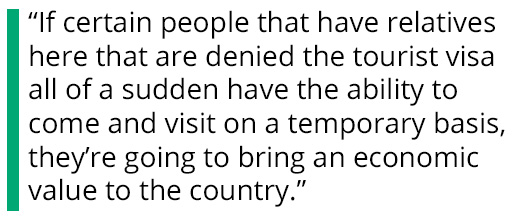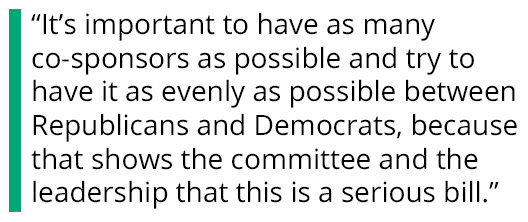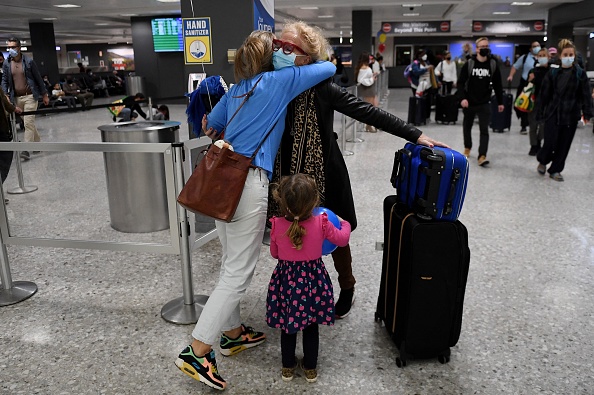Views expressed by any party interviewed by Ideaspace are those of the interviewee and are not necessarily shared by Ideaspace.
The following is a transcript of the video briefing above, lightly edited for clarity and presented here to enable users to search the participants’ comments.
Jordan Heller:
Good afternoon. My name is Jordan Heller. I’m the editorial director of Ideaspace, a 501(c)(4) that aims to enrich the U.S. immigration policy debate on Capitol Hill and beyond. Much of our research focuses on policy ideas and legislation with strong bipartisan appeal, because after all, in today’s hyper-polarized political climate, in which power is often wielded with razor-thin margins, bipartisan support is essential for converting legislation into law. Which brings us to the subject of today’s program: The Temporary Family Visitation Act, an active piece of legislation that would create a visa for foreign nationals wishing to visit family members in the U.S.
 The Temporary Family Visitation Act is remarkable for the bipartisan support it has garnered in Congress. Republican Senator Rand Paul introduced the bill in the Senate with Democratic Senator Richard Blumanthal as co-sponsor. Strange bedfellows, indeed. The House Bill boasts 17 Republican and 22 Democratic co-sponsors, with signatories as far afield as Donald Trump ally Elise Stefanik and Deputy Chair of the Progressive Caucus Katie Porter.
The Temporary Family Visitation Act is remarkable for the bipartisan support it has garnered in Congress. Republican Senator Rand Paul introduced the bill in the Senate with Democratic Senator Richard Blumanthal as co-sponsor. Strange bedfellows, indeed. The House Bill boasts 17 Republican and 22 Democratic co-sponsors, with signatories as far afield as Donald Trump ally Elise Stefanik and Deputy Chair of the Progressive Caucus Katie Porter.
Joining me today to talk about the contours of the Temporary Family Visitation Act and the bipartisan appeals they make to potential co-sponsors and supporters in Congress are Paris Etemadi Scott, an advocate of the bill and Legal Director of PARS Equality Center, which offers legal representation to many of the same people who would benefit from passage of the Temporary Family Visitation Act. And Morad Ghorban, who as Director of Government Relations and Policy for Public Affairs Alliance of Iranian Americans, is serving as the point person, or quarterback, if you will, for moving this legislative football toward the goal line.
So let’s jump into it. Before we get into how we believe this bill could be a model of sorts for achieving small but meaningful bipartisan immigration reforms, I’d like Morad to explain how his organization recognized the need for such a bill. Morad, if you will, tell us how you identified the problem that this bill aims to solve.
Morad Ghorban:
Thanks so much again, Jordan, for the work that you guys do and Ideaspace does in this forum. It’s very refreshing to have an organization out there that’s pushing for bipartisan consensus on probably one of the most divisive issues when it comes to policy making, and that’s the immigration space. So kudos to you guys.
In regards to your question, one of the things that we do annually is a poll of the Iranian-American community. We go out there and we hire a pollster and do a scientific survey to give us an idea of where our community is at on the issues and what’s important to them. And even though Iranian-Americans are very much well-integrated into American society, our polls show that they maintain very close ties to family in Iran. Around 90 percent indicate that they still have family there. Around 50 percent indicate that they have immediate relatives that are still there. So having the ability of family members to come and visit them here in the United States has always been a very important issue for the Iranian-American community, particularly because so many can’t go back to Iran for obvious political reasons. And one of the frequent complaints that we always got from our membership, and even as high up as our board membership, was the difficulty they had in getting visitor visas for family members coming here to visit them in the United States under what we call the B-2 tourist visa.
 So when we started looking into this issue, we sort of came to a realization that this isn’t an Iranian-American problem per se, or an Iranian problem, but it is something that is a problem that’s existed within the INA (Immigration and Nationality Act) from the beginning, when it was incorporated in the fifties and in the sixties. There was no carve-out for family members of U.S. relatives, U.S. citizens, or legal permanent residents to come and visit temporarily to the United States. What happens is, people have to get what they call the B-2 tourist visa to come and visit the United States as a tourist. But within the B-2 tourist visa, there is a clause [that prohibits issuance of the visa if you have] intent to immigrate, and what happens is, if you have ties to the United States, such as family ties, those could weigh against you in terms of getting the B-2 tourist visa.
So when we started looking into this issue, we sort of came to a realization that this isn’t an Iranian-American problem per se, or an Iranian problem, but it is something that is a problem that’s existed within the INA (Immigration and Nationality Act) from the beginning, when it was incorporated in the fifties and in the sixties. There was no carve-out for family members of U.S. relatives, U.S. citizens, or legal permanent residents to come and visit temporarily to the United States. What happens is, people have to get what they call the B-2 tourist visa to come and visit the United States as a tourist. But within the B-2 tourist visa, there is a clause [that prohibits issuance of the visa if you have] intent to immigrate, and what happens is, if you have ties to the United States, such as family ties, those could weigh against you in terms of getting the B-2 tourist visa.
And we’ve seen [this] corroborated through a CRS (Congressional Research Service) report that was done a few years back, where they indicated around one to two million B-2 tourist visas are denied per year, based on the intent to immigrate clause, and that the majority of these are people that have relatives in the United States. And actually, CRS in their report indicates that many people eventually give up on trying to get that B-2 tourist visa for their family members and apply for a green card. Not because they want to immigrate to the United States, but they want to be able to use that to visit relatives here, and come and go. What CRS calls unintended immigrants.
So this is how we sort of came to this problem, and then our solution was based out of many years of working with immigration attorneys and other folks in the immigration sphere, coming up with the Temporary Family Visitation Act.
Jordan Heller:
It’s a catch-22, where having family in the U.S. is a good and valid reason to visit, but it also raises a red flag with the U.S. government, where they suspect that you may intend to immigrate, strictly, precisely because of those family ties.
 Paris, in your work as an immigration attorney, you’ve represented many people who have experienced this problem, this catch-22. Can you tell us a little bit about that experience? Perhaps you can tell us about Samira Golsefid, who factors into the article that we produced [about the Temporary Family Visitation Act].
Paris, in your work as an immigration attorney, you’ve represented many people who have experienced this problem, this catch-22. Can you tell us a little bit about that experience? Perhaps you can tell us about Samira Golsefid, who factors into the article that we produced [about the Temporary Family Visitation Act].
Paris Etemadi Scott:
Yes. Absolutely. Yes. I’m an immigration attorney, and since 2017 I joined PARS Equality Center, where the predominant client base is from Iran and Persian-speaking communities, Iran and Afghanistan mainly. And I have represented clients who exactly fall within that catch-22. They’ve gone to the U.S. Embassy to apply for a tourist visa, or a visitor visa, B-2 visa, having disclosed that they have close relatives, immediate relatives here in the United States, and got a rejection because of that [inferred] immigrant intent, and had no choice but to pursue an immigrant visa, including Golsefid, who was in your article. My client first applied, the parents, mother and father, first applied for a tourist visa in 2018, during the Trump travel ban, and were denied. Now, getting a denial during the ban was almost a de facto, but the denials were coming before the travel ban. I got denied a tourist visa when I first wanted to come to the United States, and that was back in the eighties.

Jordan Heller:
And just to cut in, there’s no U.S. Consulate office in Iran. So they’re traveling great distances just to be denied.
Paris Etemadi Scott:
Absolutely. Absolutely.
Jordan Heller:
I believe in Samira’s case, for the tourist visa, they traveled—
Paris Etemadi Scott:
It was to Dubai.
Jordan Heller:
Dubai. Right.
Paris Etemadi Scott:
Yes. Yes. So every time you want to apply either for a tourist, or non-immigrant visa, you have to go to a third country from Iran. So they got denied in 2018, and so she said, “The only way I can do this is try to apply for your immigrant visa, your green card.” And despite the fact that they really did not intend to immigrate to the United States, they had family back in Iran, they had their life, their savings, their house, or they didn’t want to immigrate, but that was their only solution at that point, because they wanted to come and see their daughter. And so she applied for the immigrant visa, and it took years, again, because of the travel ban, because of the extreme scrutiny of background checks.
And eventually, in 2021, they went to the U.S. Embassy in Armenia, in Yerevan, and the mother was placed in administrative processing for no reason. She’s an elderly woman. She’s never worked with the Iranian government. She’s never had any security issues, but she was placed in extensive background check. They gave the father the visa, but by that time, the three of them caught COVID, and they went to the hospital. The father never left the hospital. He died in Armenia. And when the father died, the mother’s visa wasn’t being issued. So I kept contacting the U.S. Embassy, asking for them to expedite the issuance of the mother’s visa, so that she could go to the United States and grieve with her daughter, and they were not doing that. So it took eight months from the time the father died until the mother’s visa was issued.
Jordan Heller:
And all told, I believe the process took from beginning to end … Was it six years, I believe?
Paris Etemadi Scott:
Six years. Because they started to apply for a tourist visa back in 2016. That was the first time they attempted. So yes, this is the problem. I think I read somewhere the Department of State numbers came out with the rejection rates of the visitor visas, and it was 85.88% in 2020 for people from Iran. I think that was the highest from all countries. Perhaps Mauritania was somewhere near there.

So it’s bad. And then it’s tearing families apart. It’s literally killing families before they even get here. It’s inhumane.
Jordan Heller:
And does this situation also result in the citizens or green card holders here in the U.S. moving back to their home country, because they come here, they become a citizen or a green card holder, and then realize that they’re isolated from their family and close ties? Have you heard of people actually giving up their green card or citizenship and moving?
Paris Etemadi Scott:
Yes. Yes. Well, you can’t really give up your citizenship, unless you denaturalize, and that’s a different process. But you can actually abandon your green card. Yes. And I have had people who actually abandoned their green card, because their marriage was falling apart, or mainly these were people who were trying to get their spouses over here. And also I’ve had people, U.S. citizens who decided to live abroad in Europe or in Canada, just to be able to reunite with their loved ones.
Jordan Heller:
Now, Morad, I think it’s obvious that any bill that would provide more visa opportunities is appealing to Democratic lawmakers. Can you speak to how you promote this bill to lawmakers on the Republican side of the aisle?
Morad Ghorban:
Sure. Sure. I mean, I don’t think it’s much of a difference, but I think the appeal to everyone first is, what is the intent of this bill? It’s to reunite families for particularly special occasions like weddings, graduations. Even unfortunate circumstances like funerals, things like that, right? And I think from a family values perspective, that’s something that resonates with everybody, right?
 And then also, the potential economic impact of the bill. If certain people that have relatives here that are denied the tourist visa all of a sudden have the ability to come and visit on a temporary basis, they’re going to bring an economic value to the country. Because what do tourists do when they come to the United States? They spend money. I think the U.S. Travel Association estimates around $4,200 is spent by an international traveler that comes for a two-week period of time. From our own, very much our own experiences, we know when our relatives come here, they spend a lot more.
And then also, the potential economic impact of the bill. If certain people that have relatives here that are denied the tourist visa all of a sudden have the ability to come and visit on a temporary basis, they’re going to bring an economic value to the country. Because what do tourists do when they come to the United States? They spend money. I think the U.S. Travel Association estimates around $4,200 is spent by an international traveler that comes for a two-week period of time. From our own, very much our own experiences, we know when our relatives come here, they spend a lot more.
Jordan Heller:
And how many people do you anticipate taking advantage of this new visa?
Morad Ghorban:
I mean, I don’t think that data is set, but if you look at the CRS report, anywhere between a million to two million that are potentially denied, that could have access to this.
The other thing that this bill does, because of the strict provisions that are in the bill, for example, you can’t change your status if you’re here on this visa, so it opens the door for a number of people that are waiting for their green cards to be adjudicated, to be able to come and visit the United States while they are waiting. And we’re talking about waiting times for some people that are 10, 15, to 20 years long. And under the current B-2 system, they can’t come and visit their relatives here, because of [the] intent to immigrate [clause]. But this bill carves [out] something for them to be able to use [to get] this visa to come and visit, and then go back home. And maybe Paris could speak to how many people are in these long waiting lines, [since] that’s going to open up the door for those people as well.
Jordan Heller:
And as far as those economics, if one million people take advantage of this, and each visitor spends $4,200 on a typical visit, that’s billions of dollars added to the U.S. economy, which I imagine is appealing to lawmakers on both sides of the aisle, but especially Republicans, who in their brand are more concerned with the economy.
Morad Ghorban:
Yes. I think that’s a fair assessment.
Jordan Heller:
And as far as the economy, there’s also this situation where you have a number of families who are opting to hold weddings outside of the U.S., correct? You’ve heard stories of this?
Morad Ghorban:
Yes. Yes. We’ve heard stories from not only our community, but other communities, where the difficulty in getting that B-2 tourist visa for family members [means] opting to have their weddings, whether it be in Turkey or Mexico, where it’s easier to bring family together. We’ve heard several circumstances of those things happening.
Jordan Heller:
And what are the challenges to garnering Republican support? Can you speak about some of the tweaks that you have made to the bill to get some Republican lawmakers off the fence, as far as the work you’ve done on provisions about guarding against overstays?
Morad Ghorban:
Yeah. So when we were drafting this bill, our first intent was to make sure that it’s done in a way where it gives the best chance for the family members to come and temporarily visit their relatives here in the United States, and alleviating the concerns of what consular officers may have, right? And what are those concerns? Those concerns include, “Can this person that’s coming to the United States pay for their trip? Will they become a burden? Do they intend to immigrate, or will they overstay?” Right?
 So we put in some requirements and what we call accountability measures to ensure that these people that are coming here are going to be supported by their family. The first requirement is that the family member here in the United States has to file what we call an affidavit of support, basically saying, “I will be financially responsible for my relatives during their stay in the United States.” And the second is that they purchase travel medical insurance for the duration of their stay. What that means is basically you’re getting a policy that will cover any emergencies that may occur. So if you end up in the hospital with a broken leg, or a heart attack, or whatever, those costs will be taken care of, and the person doesn’t leave the country leaving a big hospital bill behind. And it’s based on similar models, particularly the Schengen Visa in the European Union. It’s based on that model.
So we put in some requirements and what we call accountability measures to ensure that these people that are coming here are going to be supported by their family. The first requirement is that the family member here in the United States has to file what we call an affidavit of support, basically saying, “I will be financially responsible for my relatives during their stay in the United States.” And the second is that they purchase travel medical insurance for the duration of their stay. What that means is basically you’re getting a policy that will cover any emergencies that may occur. So if you end up in the hospital with a broken leg, or a heart attack, or whatever, those costs will be taken care of, and the person doesn’t leave the country leaving a big hospital bill behind. And it’s based on similar models, particularly the Schengen Visa in the European Union. It’s based on that model.
And then there’s several restrictions to the bill. One is that this is a 90-day limit. You can’t use this more than 90 days per year. The second is, if you’ve had a relative use this visa, and they overstay, you as a U.S. citizen or legal permanent resident are barred from ever accessing this visa again. That’s sort of a self-enforcement mechanism to ensure that as the family member, as the person that has filed the affidavit of support, you are keeping track and making sure your relatives come and go.
And then the third is, that I already mentioned, is that if you are on this visa and you come to the United States, you are barred from changing your status. So what we found was a lot of B-2 overstays are based on people looking to change their status. Whether they want to get married, or find a job, they want to be able to change their status while here in the United States. Under this visa, you can’t do that. You have to go back home and reapply or wait for whatever visa you’re waiting for to get adjudicated.
Jordan Heller:
Right.
Morad Ghorban:
I think these requirements and restrictions, to your question, are somewhat appealing to certain members.
Jordan Heller:
They’ve satisfied Republican concerns about overstays.
Morad Ghorban:
Yes.
Jordan Heller:
And in my reporting on this bill, I found it interesting that when it came to navigating the Democratic side of the aisle, it was really just an issue of navigating shifting Democratic priorities. Can you speak to how the Democrats’ failure to achieve sweeping immigration reform in this Congress has opened the door for smaller bills like this one?
Morad Ghorban:
Sure. I mean, I think when this bill was introduced in October of 2020, and then reintroduced in 2021, [it was] a new idea. It takes a lot of socialization. People have to understand it, understand the dynamics around it, and why it’s needed. That’s one thing. The other thing was that there have been other immigration issues, much bigger problems that have existed for years and decades, and one of the major priorities for the Democrats coming in 2021 was to try to resolve some of these issues. And our sponsors were very clear that we need to make sure that these things are pushed through first, before we could take this bill to the next level. And we understood that, and we knew that we needed the time anyway to socialize the idea and try to build support for it, one member at a time.
 But I think once the House passed its versions of what those priorities were and then it went to the Senate, it stalled there. I think that sort of opened the space a little bit to come back to the table and look for other measures that are out there that do have bipartisan support, that are smaller in scope. It may not fix all the problems, but it addresses certain issues, and we’ve seen on the Senate side that those discussions are happening as well. And hopefully, this could be one of those measures that, while smaller in scale, can have the necessary votes to pass in a bipartisan way, and particularly meet the 60-vote threshold in the Senate.
But I think once the House passed its versions of what those priorities were and then it went to the Senate, it stalled there. I think that sort of opened the space a little bit to come back to the table and look for other measures that are out there that do have bipartisan support, that are smaller in scope. It may not fix all the problems, but it addresses certain issues, and we’ve seen on the Senate side that those discussions are happening as well. And hopefully, this could be one of those measures that, while smaller in scale, can have the necessary votes to pass in a bipartisan way, and particularly meet the 60-vote threshold in the Senate.
Jordan Heller:
Sure. And where is the bill currently in the legislative process?
Morad Ghorban:
It’s referred to the judiciary committees, both in the House and the Senate. The House Judiciary, they’ve indicated that they’re looking at several bills that do have bipartisan support, and this is one of those bills. And we know on the Senate side, that Durbin, and Cornyn, and Padilla, and Tillis have been having conversations around potential immigration bills that could muster that 60-vote threshold. We’re making sure that they know that ours could be one of those bills, too.
Jordan Heller:
Sure.
Morad Ghorban:
So the hope is that as we continue to build support in the House, that they will take this up, and potentially this could be one of the bills that could be marked up.
Jordan Heller:
And currently in the House, it’s 22 Democratic co-sponsors and 17 Republican co-sponsors. Is there a certain threshold that you look toward in order to force leadership to act?
Morad Ghorban:
I don’t think there’s a specific threshold. There isn’t a number that says, “Okay, if you get 50, we have to act on this.” You could have a bill that has 200 co-sponsors, that will never get marked up by the committee.
Jordan Heller:
Right.
Morad Ghorban:
You could have a bill that has 10 co-sponsors that could get marked up by the committee. So there isn’t a specific threshold, but I do think it’s important to have as many co-sponsors as possible and try to have it as evenly as possible between Republicans and Democrats, because that shows the committee and the leadership that this is a serious bill. It’s got a good level of support on both sides, and it’s something that could be done in a non-controversial way. They don’t need to make a fight over this, right? And hopefully this will go through the committee, or if not, the committee could release it and then bring it up under suspension bills that are basically set for non-controversial measures.
Jordan Heller:
Well, we wish you luck. It’s a very smart and common-sense bill that certainly deserves more support, and would obviously help a lot of people. Before we conclude, Paris, is there anything you would like to add?

Paris Etemadi Scott:
I just want to go back to the point Morad made about people who have applied for an immigrant visa, green card, and waiting, and how this bill can affect them. As Morad said, when you’re from those sort of Muslim majority countries, or problem countries, countries who need to apply for visa to come to the United States, when you have a pending immigrant visa, so whether it’s filed by your parents, or by your spouse, or your siblings, when you go to the embassy to get a tourist visa, they’ll say, “Wait a second. You have a pending immigrant visa, and it doesn’t match with your tourist visa that you’re applying for, so I’m going to deny it because you obviously have immigrant intent.” Now, I’ve had clients from England, and then he was waiting for his U.S. citizen wife’s petition, and he had no issues. He would just come back and forth, because he was under the Visa Waiver Program. He doesn’t need a visa to come, but I have all my clients from those countries that need a visa were routinely rejected for tourist visa because of their pending immigrant visa. So you can imagine, for a sibling petition, it takes 14 years for you to get your green card if your sibling applies for you, if your U.S. citizen sibling applies for you. Imagine for 14 years being separated from your sibling and not being able to see them. This is what’s happening right now.
Jordan Heller:
Yeah.
Paris Etemadi Scott:
And this bill, this visa would help that person who is waiting for her green card as a sibling petitioner, petitioned by the U.S. citizen sibling to come and visit during those 14 years. Why should that person be deprived? Which has happened routinely over the course of the past 40 years, for notably people from Iran. So this is a massive game changer, and putting the dollar sign aside, it’s just the people that I deal with, their lives have been upended by this extended family separation, and they have no recourse, and this will really open up massive doors for family reunification.
Jordan Heller:
And when we’re talking about parents or grandparents, people who are elderly, 14 years could be the difference between seeing your family or not.
Paris Etemadi Scott:
Yup. Yes. I mean, a U.S. citizen parent applying for a married child takes 13 years waiting. So in 13 years, they can’t visit each other.
Morad Ghorban:
Yeah. Just to add to that, I think the longest waiting periods are for people that are from India and China, I would say.
Paris Etemadi Scott:
And Mexico.
Morad Ghorban:
And Mexico. So yeah. They’re going to be greatly impacted. Because throughout these periods of time, they’re missing weddings, they’re missing graduations, and other family occasions.
Jordan Heller:
Well, thank you so much for joining us to talk about the Temporary Family Visitation Act. We will look forward to following its progress, and hopefully its success in Congress. And thank you all for joining us, all you out there in Zoom land. We look forward to engaging with you soon. And that concludes our program. Thank you very much.
Paris Etemadi Scott:
Thank you.
Morad Ghorban:
Thank you.
Read More:

Strategic Inquiry No. 8

Capitol Hill Briefing No. 6




